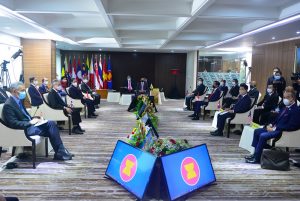Malaysia’s foreign minister has suggested his government may be willing to hold talks with Myanmar’s opposition National Unity Government (NUG), the latest sign that the nations of ASEAN are beginning to tire of the junta’s stonewalling on a Five-Point Consensus agreed in April.
Saifuddin Abdullah made the comment in Parliament yesterday, in response to a question from parliamentarian Wong Chen about whether Myanmar might talk to the NUG if the junta continued to bar ASEAN’s special envoy from talking to “all parties” to the conflict – one of the bloc’s five points of consensus.
“The process to implement the Five-Point Consensus is still being worked on with whatever that is humanly possible by the special envoy,” Saifuddin said. “If that does not happen … I believe what was raised by the MP … can be done if what was agreed in the consensus cannot be achieved.”
Since the military’s seizure of power in February, a number of ASEAN nations have held low-key, unofficial dialogues with the NUG, which was formed in April by members of the ousted civilian government, ethnic minority representatives, and civil society leaders.
But Saifuddin’s remark is the first time that a Southeast Asian government has suggested dealing with it in an official capacity. Indeed, the 10-nation bloc took some heat from its critics after declining to invite the NUG to its special summit on Myanmar in April, and has instead put its faith in engagement with the military administration.
Lest Saifuddin’s parliamentary comment be viewed as a slip of the tongue, it came a few days after remarks that he made following a virtual meeting of the ASEAN foreign ministers on October 4, when he expressed frustration that the military regime was still not cooperating with the terms of the consensus. He went on to suggest that it could be excluded from the upcoming ASEAN summit due to its lack of cooperation.
Among the five points of consensus are the immediate cessation of violence in Myanmar, constructive dialogue among “all parties” in pursuit of a peaceful solution, the delivery of humanitarian aid, and the appointment of an ASEAN special envoy to coordinate the above efforts.
But the junta has repeatedly stonewalled and delayed on the implementation of the consensus. It was in August that the 10-member Southeast Asian bloc selected Brunei’s Second Foreign Minister Erywan Yusof as its special envoy. And last week, the military authorities said that they would not grant Erywan access to detained civilian leader Aung San Suu Kyi, who is currently on trial on a raft of criminal charges.
Despite his claim that he is seeking a meeting with the 76-year-old Nobel laureate, Erywan has so far only been offered a meeting with former Vice President Henry Van Thio and the former Lower House speaker T Khun Myat, according to The Irrawaddy.
Yesterday, in response to a question about potentially being uninvited from the ASEAN Summit, Myanmar army spokesperson Zaw Min Tun dismissed the suggestion as Saifuddin’s “personal remarks” and said it wouldn’t make much different for the government in any case. His defiant response is just the latest response that Myanmar’s military is prepared to go it alone in defending its disastrous seizure of power, whatever the costs in blood, treasure, and the nation’s international reputation.
It remains unclear if and when Malaysia might engage the NUG, and whether it would offer the shadow government any meaningful support. But in a context of increasingly violent resistance to the junta’s rule, the prospect that previously reluctant governments might begin to engage its opponents should give the generals pause.

































